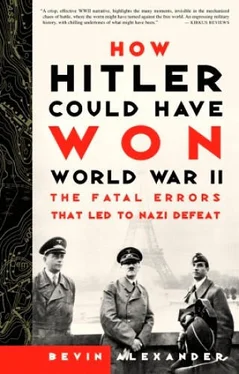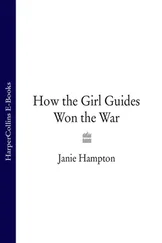After Tunisia, the Americans had committed themselves only to an invasion of Sicily. In mid-May 1943 Winston Churchill made his third visit to Washington, hoping to get an agreement to assault the boot of Italy. This, he argued, would lead to a quick Italian surrender. Churchill avoided mention of his real purpose: to turn the Americans away from a cross-Channel invasion.
But General Marshall insisted that Operation Bolero, the buildup in Britain for a cross-Channel attack (Operation Roundup), take precedence over anything else. This did not rule out an invasion of Italy, but Marshall hoped to prevent any shift toward the Mediterranean.
He was partly successful. The conference, code-named Trident, established early March 1944 as the date for the invasion of France, an operation that soon received the new code name Overlord. Nothing was said about Italy.
Churchill didn’t accept the silence at Washington as final and called a meeting at Eisenhower’s headquarters in Algiers for May 29, 1943, to push for an Italian invasion, and, by inference, abandonment of Overlord. General Marshall attended, but Churchill stacked the deck with Alan Brooke, chief of the imperial staff, and all British commanders in the Mediterranean.
Eisenhower was interested in gaining the airfields around Foggia in southern Italy to attack the Ploesti oil fields and targets in southern Germany, but he was not enthusiastic about a campaign up the rugged mountainous boot of Italy, especially since rain, mud, and immobility would be coming with winter.
Churchill was cagey enough not to propose more than seizure of southern Italy, but Brooke confessed privately to Eisenhower that he wanted to avoid any wider land front than the Allies could sustain in Italy, and preferred applying Allied air and naval power to blockade Germany and destroy its industry.
Eisenhower knew Marshall would never accept abandonment of Overlord, but he found himself agreeing to seize Naples and the Foggia airfields. Churchill and Brooke were satisfied. An Allied army was unlikely to stop with Naples and Foggia. Once the camel’s nose got under the tent, the whole animal was likely to follow. Churchill might still get his Mediterranean strategy.
The key to Sicily was the narrow Strait of Messina (in Greek mythology guarded by Scylla and Charybdis), less than three miles wide, which divides the northeastern tip of the island from the toe of Italy (Calabria). Any supplies to and evacuation from Sicily had to pass this bottleneck.
Since the Allies held command of the sea, the way to assure the capitulation of the enemy on Sicily without firing a shot was to invade the toe of Italy. There were virtually no Axis troops in Calabria. Its occupation would have separated Sicily from the mainland and prevented the evacuation of troops from the island—except those few who might have been flown out.
This idea never received serious consideration. Part of the reason was the hesitation by the Americans to commit to an invasion of mainland Italy. But the principal reason was Eisenhower’s unwillingness to undertake any operation that was not conservative, sure, and direct. The American naval historian Samuel Eliot Morison wrote: “The entire Husky plan was wrong…. We should have attacked the Messina bottleneck first.”
General Heinrich-Gottfried Vietinghoff-Scheel, who commanded the German 10th Army in Italy, wrote that the Allies could have seized the Strait of Messina “without any special difficulty.” If this had happened, Albert Kesselring, German commander in chief south, said it “would have turned the landing in Sicily into an overwhelming victory.”
Instead, Eisenhower approved a completely frontal attack. General Montgomery’s 8th Army was to land at the southeastern corner of Sicily, while George Patton’s U.S. 7th Army was to come ashore immediately to the west.
This was where the Italians and Germans expected the invasion, and where the Axis commander, Italian General Alfredo Guzzoni, had posted his 275,000 men in eight coastal divisions (static forces made up mostly of Sicilian conscripts), and four mobile Italian divisions, with two German divisions (the 15th Panzergrenadier and the Hermann Göring Panzer) divided into five mobile reserve groups.
Hitler had not sent more troops to Sicily because he suspected Mussolini might be overthrown and the Italians sue for peace. He also was not sure the Allies would land in Sicily. To him Sardinia was a more logical target. Possession of this island would provide an easy jump to Corsica just to the north, and from Corsica the Allies could strike at southern France or northern Italy. He also thought the Allies might land in Greece and push northward through the Balkans.
British intelligence officers abetted Hitler’s misconceptions. They planted papers on the body of a “British officer” washed ashore on the Spanish coast. In addition to identity papers and personal letters, the documents included a private letter written by Sir Archibald Nye, vice chief of the Imperial General Staff, to General Alexander saying the Allies intended to land in Sardinia and Greece while aiming to convince the Axis that Sicily was the target.
Nazi agents in Spain were convinced the letter was authentic. Though it didn’t sway Kesselring or the Italian chiefs, it made a strong impression on Hitler. He sent 1st Panzer Division from France to Greece, the 90th Panzergrenadier Division to Sardinia, and Kurt Student’s 11th Air Corps of two parachute divisions to the south of France to intervene when the Allies invaded Sardinia.
It took Eisenhower and his senior generals until May 13 to finish their plans. Yet, since only one of the divisions intended for Husky was being used in the last stages of the Tunisian campaign, the invasion could have followed directly on the heels of the Axis surrender. If this had happened, the attackers would have found the island virtually bereft of defenders and could have seized it almost without casualties.

Because of extreme caution, therefore, the Allied invasion of Sicily was delayed to July 10, 1943. The only surprise was that a storm unexpectedly blew up, and the members of the Italian coastal divisions, who were not much interested in fighting anyway, went to sleep thinking the Allies would wait for good weather.
Four British divisions landed on a forty-mile stretch on the southeastern corner of Sicily around Syracuse and Cape Passero, while four American divisions landed to the west on a forty-mile front across the beaches around Scoglitti, Gela, and Licata. A total of 150,000 troops came ashore on the first three days; ultimately there were 478,000: 250,000 British, 228,000 American.
The American landing was made possible by use of new LST (Landing Ships Tank) and DUKW amphibious trucks.
Italian naval response was weak. Only four ships and two LSTs were lost—to submarine attack. Meanwhile Allied aerial superiority was so great (4,000 aircraft against 1,500 German and Italian) that enemy bombers had withdrawn to central Italy.
The worst Allied losses were in airborne troops. Parts of the British 1st and the American 82nd Airborne Divisions were to land inland and seize key points. But high winds scattered the Americans over a fifty-mile radius and caused 47 of 134 British gliders to fall into the sea.
On none of the landing sites did the Italians offer any resistance. General Sir Harold Alexander, in command of land forces, wrote: “The Italian coastal divisions, whose value had never been rated very high, disintegrated almost without firing a shot, and the field divisions, when they were met, were also driven like chaff before the wind. Mass surrenders were frequent.”
Читать дальше



![Джонатан Димблби - Barbarossa - How Hitler Lost the War [calibre]](/books/385421/dzhonatan-dimblbi-barbarossa-how-hitler-lost-the-w-thumb.webp)









